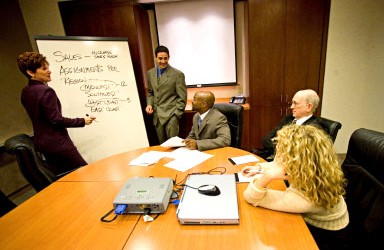The Grave Digger’s Shift — What to Consider When Presenting Later in the Day
Is your presentation scheduled for 3 p.m or even later? If so, you’re in the Grave Digger’s Shift. In fact, any time you speak in the afternoon, you run the risk of digging your own grave unless you are interesting and engaging. People are tired and typically have a...
What Influential Speakers Routinely Do
Everyone wants to be influential when in front of a client, a boss or even peers. For many of us, being persuasive is a crap shoot, where sometimes things go great, but, at other times, we wish for a “do-over.” Those who are known as powerful, motivating...
The Global Audience Shouldn’t Feel Undervalued
Hosting a meeting with a team located around the globe is challenging. People come from different cultural and language backgrounds. Often, those located away from the parent company feel like stepchildren who are tolerated, but certainly not prized. When meeting with...
Breakthrough or Breakdown
Nobody wants to leave a meeting having a breakdown, wishing you would have done something differently. All of us want to be breakthrough communicators. Getting your message across doesn’t happen by accident. It depends on considering 5 key things: Preparation. First...
Captivate, Motivate, Educate
Creating a “knock your socks off” business presentation can seem overwhelming. Regardless of whether you’re making a formal presentation at a conference or sitting across the table with a client or your boss, there are three key things to remember. Captivate Motivate...
Why Your Ideas Don’t Get Accepted
There are three reasons ideas don’t get accepted according to Rick Maurer, author of Why Don’t You Want What I Want? Reason #1: “I don’t get it.” Reason #2: “I don’t like it.” Reason #3: “I don’t like you.” Reason #1 “I don’t get it.” If customers don’t understand...
Achieving Expert Status as a Communicator
Malcom Gladwell in his book, Outliers, says it takes 10,000 hours to join the ranks of “Expert.” His theory is that people who become experts at anything first want to excel, and then they put in the effort. They work hard to perfect their skill by doing it over and...
The Grave Diggers Shift: Presentations after 3 p.m.
Is your presentation scheduled for 3 p.m. or even later? If so, you’re in the Grave Digger’s Shift. In fact, any time you speak in the afternoon, you run the risk of digging your own grave unless you are interesting and engaging. People are tired and typically have a...
Tune Them in by Involving Them
Most of the time when people are brought together for face-to-face meetings, the purpose is for persuasion- either to accept an idea, buy a product or approve a decision. Often, these meetings are not successful because the speaker misunderstands the need for audience...
Tips for Seamless Team Presentations — A Baker’s Dozen
Most business professionals, regardless of their industry, participate in team presentations. The team approach ideally reinforces the idea that each person will take ownership of the success of the project or the account and also that each person is an essential...
How to Sell Like a CEO, When You’re Not!
Carly Fiorina was CEO of the Hewlett Packard organization for over 5 years. Fiorina was a charismatic leader and was extremely successful in rallying the board around her ideas and her strategies. Despite several missed profit expectations and an 8% drop in stock...
Be Heard — a Non-Fail Recipe
We all know that a speaker needs to be heard, whether it is in giving an update on a project, advising a client on an investment opportunity or explaining the functionality of a new product. Yet so often, business professionals are not heard. They do not connect with...
How to Wow in One-on-Ones
One-on-one meetings can often be intense. Obviously, it is important to showcase your best self- a person who is confident and committed to his or her ideas. Your body language says it all. To deliver your message and wow, consider the following suggestions.
The Art of Persuasion: Two Musts!
From the time we are babies, we try to persuade others. Babies want more milk, elementary school kids want to stay up late and teens want the car. Given the fact that we have been practicing persuasion for so many years, you would think that as adults we would be...
Intentional Listening — It’s an Advanced Skill!
If you think you are a good listener, think again. Study after study confirms that most people listen effectively only 25% of the time. Instead of listening, they are focused on responding. What is often overlooked is that there are three levels of listening. At the...
Applause Winning One On One Meetings
If your approach to being successful in a one on one meeting is to keep your fingers crossed and “hope” it turns out well, you risk disappointment. Applause winning meetings take thoughtful preparation and flawless execution. The following tips before, during and after may turn the tide for you:
Getting from Ordinary to Extraordinary – The When, Where, How and Why to Improving the Way You Communicate!
People who are extraordinary communicators don’t start out that way. They work at getting better. They take communicating effectively seriously. They practice. They learn the When, Where, How and Why to improving the way they communicate. When: People who are fabulous...
Eliminating Verbal Static: Tips for Curing Filler Words
Filler words, such as “um,” “ah,” “like” and “ok,” represent verbal static or noise that your listeners have to filter out. The more fillers you have, the more difficult it is for your listeners to hear your message. Minimizing these annoying irritants will boost your credibility.
Don’t Supersize Your Listeners
Presentations that change minds are not overly complex. They are simple with a limited number of key points. If you want to impress your listeners, don’t “supersize” the portion of information you give them. They aren’t that hungry. They will leave much of what you...
“I’m Just Not That Funny!”
Most people enjoy humor. They love to laugh. However, when it comes to the workplace, opinions vary. Some people feel it’s a good thing, others do not. Even in the camp that says humor is a good thing, a lot of folks would say, they are just not funny! Humor, if done right, can be a great tool for relating to your listeners whether face to face, on the phone or virtually.
What People Often Forget When Making a Presentation!
Savvy presenters know you have to get two things right, your opening and your close. If you do those well, you will be a success because people remember the first words out of your mouth and the last. However, while presenters know the importance of a strong opening and close, often they fizzle at the end. Some run out of time and simply say “I am out of time. Thanks for coming and contact me with your questions.” Others fail to let their listeners know they are about to end. When the say their final words, people have no response. They leave uninspired or disinterested. Put as much time into writing and practicing your close as you do other parts of your presentation.
Practice Doesn’t Make Perfect
We’ve all heard the old adage, “Practice makes perfect.” Practice doesn’t make perfect; it makes it permanent! It can reinforce bad or wrong habits. Getting to the next level in your communication skills depends on knowing what you are doing well and what you doing that is distracting. Feedback is critical
Things We Forget That Affect Our Impact
Little things matter when it comes to influencing others. Overlooking these may be costly since they cause confusion and delay a decision. The wise communicator avoids the Big Seven Sins or missteps like the following.
Seven Reasons Why “C” Suite Executives Are Terrific Communicators
Rarely, does anyone make it into the senior ranks of a company without being a terrific communicator. It just doesn’t happen. However, it is a mistake to think that the “C” Suite Executive is someone who, by nature, is good at communicating. No one is born a great communicator. That person honed his or her skills over the years. Here is what makes them great.
How to Connect with Your Listeners
Most people feel they are unique. Before they can be receptive to your ideas or recommendations, they need to know you “get them.” As you speak to any individual or group, apply or link your points to the things they care about- and do it often! Do it at the beginning, middle and end of your conversation or presentation. Here are some tips and examples.
Corralling Your Nerves
Speaking publicly to a group can be traumatizing. In fact, Jerry Seinfeld, comedian extraordinaire, joked about preferring to be in the coffin than to be the person giving the eulogy. If you are one of those people that find themselves anxious, here are some tried and true tips.
Making the Executive Connection
Connecting with Executives doesn’t happen automatically. It takes understanding what is important to them and learning how they think. In the years that IMPACT Communication has worked with those at the top, here are some of their comments on what makes a difference.
What Counts in the Influence Game
Influencing others can seem daunting, but when you pay attention to these key principles, it is easier than you think.
How You Sabotage Your Success as a Presenter
Have you ever left a meeting wishing you had a chance for a “do over?” The bad impression you left is often indelible, and it may leave senior leaders questioning your capabilities. When we queried managers, directors and VP’s from an assortment of industries as to...
Getting Serious about Trust? Some Tips on What Not to Do
Being a Trusted Advisor, in the eyes of many experts, is the Holy Grail. It’s what you should strive to become if you are selling a product or a service. It takes time and perseverance to develop such a relationship, but the rewards for both parties are enormous. However, be aware there are some things that will erode the relationship. Assess what follows to insure that you are doing nothing that puts this all important relationship in jeopardy.
Learn the Secrets of the Pros
The key thing to adding value is know your audience and to show the link between your solution and the needs of the individuals. Listeners don’t like to work at understanding, and they don’t like to feel their issues were unnoticed. The more clearly you show value right from the get-go by reiterating known and unknown issues and by providing examples and stories to prove that your product or service solves these problems, the more likely you are to being successful.
Shore Up Your Relationships – They’ll Keep You in Business
High performing companies know the value of building relationships with their customers and vendors. Relationships drive growth and revenue. They carry you through the tough times and may even give you an edge if there are shared intimacies. However, while we know this on one level, often our daily tasks consume us, and we don’t pay enough attention to the little things that affect deepening or growing the relationship. Here are some things to consider.
The Grave Digger’s Shift – What to Consider When Presenting Later in the Day!
Is your presentation scheduled for 3 p.m or even later? If so, you’re in the Grave Digger’s Shift. In fact, any time you speak in the afternoon, you run the risk of digging your own grave. People are tired and typically have a lot to do before they end their day. You absolutely cannot present information the same way as you would in the morning when people are fresh and less distracted. Here are some key things to remember.
Three Quick Tips for the Meeting Facilitator
Facilitating a meeting can be frustrating. Often, nothing gets accomplished. People start talking among themselves, or they start texting on their phone. No one seems to know where the meeting is going. To get results, you need to understand some key principles.
What’s Your Objective?
Just as competitive athletes visualize the outcome of their performance before the game begins, it makes a lot of sense for you to do the same thing. Never go into a meeting with only a vague idea of what you want to accomplish. Know ahead what you want people to think or do differently after your meeting. Being unfocused wastes time and leads to disappointing results. With clarity about your objective, you can align your goals and discussion points with what is important to them.
How Strong is Your Core?
Every athlete knows that if you want to perform well, you have to have a strong core. They also know that the time to strengthen their core is not while running a marathon or playing 18 holes of golf. It needs to happen long before and gradually over time. The same is true for a presenter. You have to have a strong core.
Great Presentations are a Conversation
Picture yourself attending a staff meeting. How happy are you when the host of the meeting drones on about the numbers or the specifications of a product. Most of us hate lectures. What we do like and appreciate is a great conversation. So how do you as a speaker turn something that seems like a formal presentation into a more relaxed conversation?
5 Content Tips That Drive Action
Convincing people to act on your ideas is an art. If you are one of the people who approach preparing content by opening PowerPoint, this newsletter is for you. What follows are five content tips that will help you to create high impact presentations. On the surface, they may seem too simplistic. The reality is that most people overlook these pointers and end up with content that is confusing or uninspiring.
Making It Stick by Keeping It Simple
As speakers, we are actually training our audience to spread the “good news.” With a limited number of key points, listeners have a better chance of remembering what we have said, and they can accurately share that information with others who have decision-making power or with those who missed the presentation.
Tell a Story and You’ll Connect
Most people begrudging attend meetings with vendors or salespeople. They look upon them as an interruption. The last thing they want when they are busy is more information about a product or service thrown at them. When they actually do meet with you, they are often distracted and pre-occupied- anything but focused on you. In addition, when the meeting is over, they quickly forget your message as they move from meeting to meeting. Your job is to pull distracted executives into your world; otherwise, all your hard preparation is for naught. Your one-time golden opportunity may be lost forever.
What Marv White Says about Making an Executive Level Presentation
An executive’s time is valuable. These individuals go from meeting to meeting. It is not unusual for them to have as many as 10-15 meetings a day. For Marv White, Chief Technologist for Innovation at ESPN, an entertainment sports programming network and formerly CTO of Sportvision, a sport and data content company that created the “yellow first and ten line,” it’s all about the ideas and figuring out how to execute on them. In interviewing Marv, he offered these suggestions on what a successful executive level meeting should be.
Connection Matters
How you relate to others matters when making a face-to-face presentation. What creates a connection with any executive, manager or peer, first and foremost, is strong eye contact. Another way is to allow your spontaneous sense of humor and playfulness to surface during the conversation. Finally, connection also comes from being observant and using the person’s name.
Guidelines for Great Large Group Presentations
What is the difference between your audience and an elephant? An elephant never forgets; an audience occasionally remembers.
You go to a lot of trouble to prepare for a large group presentation. You want it to be a success and people to feel their time was well spent. If you can put a check in front of the following guidelines, you will likely score a big hit.
Being as Good as the Big Guys
It takes 10,000 hours of practice to become an elite presenter. While this may seem overwhelming stop and think about how you can practice and be coached to improve your current standing.
Need Influence? Read Below!
How often have you heard someone say to you, “You need to be more influential?” When we hear that request, often we don’t know how to address the issue. From a communication standpoint, three issues are critical to being influential.
Quick Tips for Handling Loose Cannons!
Individuals who seem attacking can disarm even the most experienced speakers. When statements start with an accusation or an acerbic tone of voice, it is hard to keep your composure, especially if others are witnessing this attack. Difficult individuals or 'loose...
Promise Never to Commit these Presentation Crimes
They say there are three presentations we give: The one we planned to give, the one we actually gave, and the one we wished we would have given. A lot of us leave a presentation wishing for a “do-over.” What can destroy a good outcome are the following “Presentation Sins.”
Why I Simply Can’t Trust You
The aim of any presenter is to be trusted. Yet, time after time, listeners aren’t sold. Many even comment, “You know, there is something about that guy that I just can’t trust.” What you say and how you say it is critical to establishing trust. Albert Mehrabian,...
The Storyteller’s Checklist
People are moved by their heads and their hearts. Data alone won’t convince people. Knowing this, many companies have adapted a storytelling approach with their customers. An engaging story helps to deepen the human connection and increase the likelihood of ideas being remembered. It also distinguishes the presenter from others. If your company has embraced this approach, the Storyteller’s Checklist will ensure your success.
Presentations Are Out: Sharing Your Story Is In!
Customers are not crazy about formal presentations. They complain that presentations often seem prescriptive and downright boring. When surveyed, one of our clients said, “The last thing I need in my day is one more sales person doing a dog and pony show. What happened to the good old fashioned conversation?” Customers today want interaction. A sure-fire way to involve listeners is with a good story.
Add Up to Real Value
The key to adding value to your presentation is know your audience and to show the link between your solution and the needs of the individuals.
Giving an Update? Tell Me What’s New and What’s to Do
Bringing people together for the sake of providing information” makes no one happy, primarily because most of us are on information overload anyway. If you focus your content on solving a problem, rather than on just providing information, your meeting will be seen in a whole new light. Listeners will stay attentive if you tell them “what’s new” and “what’s to do.”
Reach, Teach and Touch – 3 Requirements for Any Presenter
Selling your idea isn’t easy. Listeners are inundated with information all day long. Additionally, they are often doing the job of several people and, consequently, are consumed with their own issues and tasks. To get your message remembered over others, you must Reach, Teach and Touch.
Establish Credibility by Being a Trusted Advisor
What business person wouldn’t covet being thought of as a trusted advisor! Obviously, customers or internal people would act on your recommendations and promote you and your ideas to others. They would turn to you first to improve the quality of their business and sign contract after contract. However, it takes more than good advice. You must know how to earn trust.
Quick Tips for Creating Slide Shows
Almost all of us use slides as we present to our bosses, customers, peers or direct reports. However, not all of us create them effectively. Rather than aiding comprehension, slides can erode meaning and cause confusion. Often, they consist of boring bullet point lists or complex charts or graphs. Nancy Duarte in her book Slide:ology, de-mystifies how to make a slide deck effective. Here are some quick tips.
You Can’t Leave Your Communication Skills behind Just Because You Are at Lunch
Many professionals conduct business over lunch. The atmosphere is often more relaxing and conducive to discussing important matters. However, the business lunch can be dangerous. Some people seem to leave good communication skills at the office. They forget basic principles that ultimately may erode a relationship and affect the purpose of the luncheon.
What Tony Hayward Should Learn about Handling Tough Questions
Tony Hayward, CEO of BP Oil, has become a punching bag for Gulf Coast residents, as well as newscasters. His penchant for making insensitive and misleading statements may have done irreparable damage to his reputation and the reputation of BP Oil Corporation. Hayward’s handling of the oil spill in the Gulf will undoubtedly become a text book example of how not to handle a disaster. Here are eight important actions to remember in dealing with tough questions or the media.
Connection is Everything
How you relate to the audience affects the outcome of the meeting. People more readily accept information and close business with those they like and trust. What creates a connection with any listener, first and foremost, is strong eye contact. Beyond eye contact there are subtle things like nodding or leaning forward. We also connect by using humor, being attentive and listening well.
Pre-game Jitters When Presenting to the Boss
Presenting to the boss is a double edged sword. On the one hand, it is an opportunity to show what you know, to be the next MVP. On the other hand, if the boss thinks poorly of you or hates what you say, you may be forever sitting on the sidelines or worse yet, sent home. There are four keystones that will support you in stressful times. Embrace all four and you will feel composed and raring to go. Embrace only some and you won’t.
2010 The Year of Relationship
2010 is certainly the year of relationships. As people hunker down, they look to those they know rather than to outsiders. Take the time to deepen your existing relationships and notice the benefits you will receive.


























































Recent Post Comments